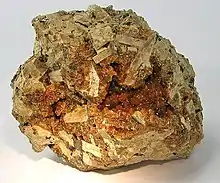
Orthoclase crystals with flecks of biotite in a shallow pocket with glittery crystals of transparent stilbite from the Granite Mountain area
Granite Mountain is an igneous intrusion southeast of Little Rock, Arkansas.[1] Despite being named after granite, the rock at Granite Mountain is actually syenite,[2] a rock that is visually similar to granite, but contains much less quartz. The rock was formed in the Cretaceous period around 90 million years ago, after the lamproites at Prairie Creek and the later Magnet Cove complex, and before the formation of the Monroe Uplift and Jackson Dome.[3]
References
- ↑ "Arkansas Alkaline Province". faculty.uml.edu. Retrieved 2018-11-23.
- ↑ "Statemap Field Blog—Nov 12-14, 2013". Arkansas Geological Survey Blog. 2014-01-27. Retrieved 2018-11-23.
- ↑ Baksi, Ajoy K. (1997). "The Timing of Late Cretaceous Alkalic Igneous Activity in the Northern Gulf of Mexico Basin, Southeastern Usa". The Journal of Geology. 105 (5): 629–644. doi:10.1086/515966. JSTOR 10.1086/515966.
This article is issued from Wikipedia. The text is licensed under Creative Commons - Attribution - Sharealike. Additional terms may apply for the media files.